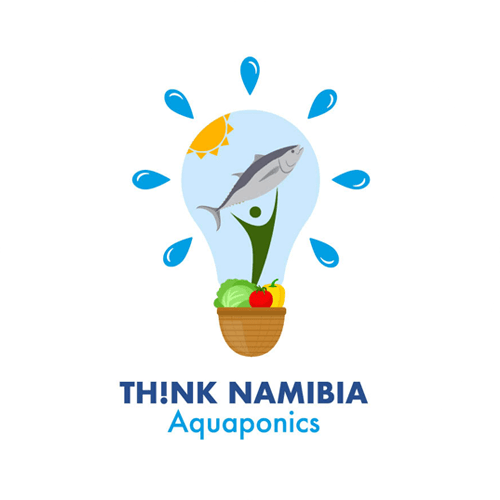Aquaponics Project Namibia
Project duration: 2020 - 2021
Contributing to Food Security in Namibia using Aquaponics-Systems in a Pilot Project Approach Project
The ‘Contributing to Food Security in Namibia using Aquaponics-Systems in a Pilot Project Approach’ Project is a recently launched initiative of the ongoing TH!Nk Namibia Campaign with activities spanning for the duration of 2020 – 2021.
Funded by the Embassy of Finland, the Aquaponics Project aims to support in improving local knowledge, training skills, and human capacity development in the field of climate-resilient aquaponics with the overall objective of promoting food security and creating new livelihood opportunities in Namibia’s rural communities.
Over 60% of Namibians are directly or indirectly dependent on agriculture as their main source of sustenance, income, or other form of material support, with those living in communal areas being particularly reliant on subsistence farming. The majority of rural communities also grapple with high levels of unemployment and live on meagre incomes, thereby compounding agricultural dependence still further.
In addition, the combined effects of Namibia’s prolonged economic downturn, devasting periods of drought, as well as the ongoing economic fallout of the COVID-19 pandemic have imposed new hardships on already struggling communities in the rural areas. Lastly, total agricultural production yields from rural farmlands continue to deplete as a consequence of climate change.
To provide a climate-smart agricultural solution to these issues, the Aquaponics Project is being launched as an alternative pathway to achieving food self-sufficiency and economic sustainability in Namibia’s rural areas. On 30 March 2021, the Project will formally inaugurate its first pilot aquaponics system at Aris Primary School, before handing system operations over to the school and the wider community.
Aquaponics presents a climate-smart alternative practice that has the potential to enhance agricultural production, boost food security and improve living standard in rural Namibia. Given the impact of climate change on the world’s environments, Namibia urgently needs to take bold and transformative action to develop traditional agricultural systems to become climate resilient and sustainable.
The objectives of the Aquaponics Project are to:
- Improve the understanding of climate-smart aquaponics among interested individuals
- Improve the knowledge and skills on aquaponics amongst rural communities
- Promote the development and use of aquaponics by rural communities.
The target group consists of interested individuals, learners, teachers, as well as members of the local communities.
Outcomes and Achievements of the Aquaponics Project (interim balance December 2020):
So far, the Aquaponics Project re-branded the TH!NK Namibia Campaign to focus its third phase on food security and climate-resilient aquaponics.

Furthermore, the Aquaponics Project in collaboration with a group of students from the Worchester Polytechnic Institute (WPI) in the USA has designed five educational Fact Sheets and one Poster on the benefits and use of aquaponics systems.
Aquaponics Fact Sheets Series
- Factsheet 01: Aquaponics
- Factsheet 02: Producing Fish
- Factsheet 03: Producing Crops
- Factsheet 04: Hydroponics
- Factsheet 05: Building and Maintaining
Find the fact sheets from all TH!NK Namibia campaigns:
Aquaponics Posters
Find the posters and infographics from all TH!NK Namibia campaigns:
Blog Documenting Work on Aquaponics
Due to the Covid-19 pandemic, the WPI students could not visit Namibia like a previous group of students did in 2019 to collaborate with the PREN Project. The WPI students also created a blog to document their remotely work on aquaponics.
Aquaponics Videos
As further part of the educational material, the project created three short educational videos which explain the concept of aquaponics and can be used as construction manual.
Find the videos from all TH!NK Namibia campaigns:
Baseline Study for potential project implementation sites in the Zambezi-Region
Moreover, a Baseline Study was conducted that pre-selected potential project implementation sites in the Zambezi-Region. Based on this Baseline Study, the Aquaponics Project will commence with the building of aquaponics systems and the implementation of workshops in rural secondary schools as of the start of 2021.
System building and workshop implementation
The system building and workshop implementation in the Zambezi-Region will be based on the experiences made at the project’s first implementation site, Aris Primary School.
Established in the 1980s, Aris Primary School is a social initiative of the Farm Krumhuk. The school is situated in Aris village, approximately 20 kilometres south of Windhoek and provides education to roughly 175 children between the first and seventh grades. As a public boarding school, it also provides accommodation to families, teachers, and learners.
The construction of the aquaponics system at Aris Primary commenced shortly after the COVID-19 State of Emergency was lifted in Namibia during September 2020. Our partner, Eco Smart Water Technologies Namibia CC was contracted to construct and install the project’s first aquaponics system. The team of five staff was able to successfully build a modern, efficient, and effective aquaponics system to serve as a pilot model for training purposes. A series of educational videos are currently in development based on peer documentation of the construction process to be used in future training workshops and the TH!NK Namibia Campaign.
If everything goes according to schedule and as panned, we expect to have the project’s first aquaponics system up and running successfully by the end of December. Thereafter, the training workshop will follow in January 2021.

